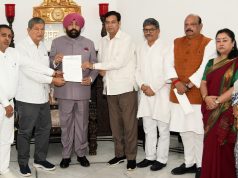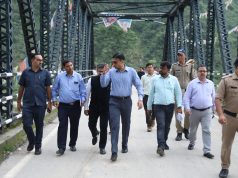Garhwal Post Bureau
Dehradun, 18 Sep: Under the joint aegis of Doon Library and Research Centre (DLRC) and SPECS (Society of Pollution & Environmental Conservation Scientists), significant lecture was organised today as part of “The Dehradun Dialogue” (TDD) on the topic, “Know and Understand Food Adulteration”.
The event began with a welcome address by Dr Chandrashekhar Tewari of DLRC, who extended gratitude to Dr Brij Mohan Sharma for delivering a technical presentation on such a critical and timely subject.
On behalf of TDD, Hari Raj Singh introduced Dr Sharma to the audience.

The event was supported by Sridev Suman University, Uttaranchal University, Samay Saakshya, and Speaking Cube.
Environmental scientist and social activist Dr Brij Mohan Sharma addressed students, teachers, social workers, and citizens, highlighting the alarming reality of food adulteration and the urgent need for collective awareness.
Dr Sharma began his lecture by tracing the historical perspective of adulteration, emphasising that, while it has existed for centuries, the modern era has seen the problem become widespread and more hazardous.
He explained in detail how almost every item of daily consumption—whether kitchen staples, market-bought goods, or festival foods—is prone to chemical or physical adulteration. From urea and starch in milk, synthetic oils in paneer, vanaspati in ghee, chemical dyes in turmeric and chili powder, mineral oils in edible oils, chalk in sugar, and stone powder in salt—the list of adulterated products is endless.

Even fruits and vegetables, Dr Sharma cautioned, are artificially ripened with calcium carbide or polished with waxes and synthetic colours to appear fresh, hiding poisonous elements beneath the surface. Similarly, sweets often contain synthetic colours, aluminium-coated foils instead of pure silver, and chemical syrups.
He warned that such adulteration not only cheats consumers but also gradually turns the human body into a breeding ground for diseases—ranging from cancer, kidney disorders, liver failure, hormonal imbalance, digestive issues, and stunted growth in children.
Dr Sharma stressed that adulteration detection is not limited to laboratories. Many adulterants can be identified at home through simple scientific tests.
During the lecture, he performed live demonstrations showing how common people can easily test food items like milk, turmeric, sugar, tea leaves, flour, salt, and pulses at home to detect adulteration. Examples provided were – a drop of pure milk spreading slowly vs. adulterated milk spreading quickly. Pure turmeric not dissolving completely vs adulterated turmeric colouring water deep orange. Chalk residue in adulterated sugar. Artificially coloured tea leaves releasing dark colours instantly. Lime in wheat flour reacting with lemon juice to form froth. Artificial polish from pulses coming off when soaked in water.
He urged students, teachers, and citizens to adopt these home tests and spread awareness, remarking, “An aware consumer is the strongest weapon against adulteration.”
Dr Sharma also highlighted that SPECS launched a mass movement against food adulteration in 1999, organising workshops, testing camps, and awareness programmes across the country.
In 2004, SPECS developed an innovative food-testing kit named “Rasoi Kasauti”, approved by the Department of Science & Technology, Government of India. This kit has been widely used across states and districts in India.
The “Char Dham Milavat-Mukti Abhiyan” by SPECS became a landmark campaign in Uttarakhand, educating pilgrims, shopkeepers, and the public about adulteration and its consequences.
Dr Sharma emphasised that tackling adulteration requires collective responsibility—not just of the government but also of families, schools, society, businesses, and senior citizens.
He also elaborated on solutions at various levels.
At the Family Level, teaching children simple food tests, promoting self-reliance (home-grown vegetables, homemade pickles), and using elders’ experience in identifying purity. At the School Level, including food safety in curriculum, forming food safety clubs, involving students in testing mid-day meals, and inviting elders to share knowledge. At the Society Level, awareness through rallies, street plays, RWA meetings, and honouring honest shopkeepers. At the Business Level, encouraging self-certification, QR-based product traceability, quality storage chains, and CSR-based awareness programmes. At the Government Level, stricter laws, fast-track courts, mobile testing vans, affordable testing kits, whistleblower protection, and nationwide awareness campaigns.
He urged elders to share traditional methods of food purity detection through workshops and documentation.
Calling the excessive use of preservatives and synthetic chemicals a matter of grave concern, Dr Sharma recommended stringent regulations and testing standards; mandatory lab testing for food products; complete ban on harmful and unauthorised chemicals; public disclosure of preservatives used in products; better training and equipment for food safety officers; coordinated action between FSSAI and state agencies; strong enforcement with penalties for violators.
A total of 98 participants, including students and teachers from Uttaranchal University and Maya Devi University, as well as online participants through YouTube Live, took part in this interactive session.
Dr RP Bhatt, former Director General of Health Services, Uttarakhand, appreciated the technical aspects of this unique initiative. Experts and social workers such as Chandrashekhar Tewari (DLRC), Dr RP Bhatt, Dr Yash Pal Singh, Dr Dinesh Sati, Ranu Bisht, Hari Raj Singh, Dr Vinod Kumar Bhatt, Balendu Joshi, Dr Vijay Gambhir, Himanshu Ahuja, Vijay Bhatt, RK Mukherjee, Ram Tirath Maurya, and Ashok Kumar also participated.








